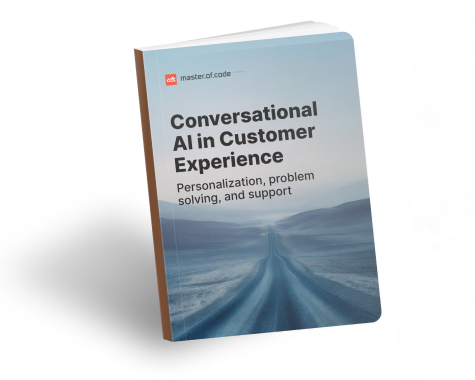Did you know that 74% of decision-makers recognize the detrimental impact of poor buyer experience on company revenue? Conversely, providing high-quality client care can significantly boost consumer loyalty, drive sales, and enhance brand reputation. Naturally, this leads to a crucial question: How can enterprises elevate their support services to such a distinguished level? This is where the role of Conversational AI for customer engagement becomes pivotal.

In fact, the primary interests driving AI adoption are user self-service automation (97%) and real-time agent assistance (87%). Furthermore, almost half of the businesses acknowledge that lagging in its usage could leave them trailing behind competitors. So, what makes this technology so compelling for companies?
Integrating Conversational AI for customer service equips your agents with deeper insights into client contexts. It empowers users to self-serve effectively, enhancing satisfaction and reducing the burden on your team. Additionally, it ensures better resolution of complaints. This is achieved by accurately detecting individual sentiments through artificial intelligence algorithms.
Being a marketer with over 6 years of experience in different industries, I’ve arranged this comprehensive guide to give you a clearer picture of what AI can offer your customers. We’ll delve into its benefits, real-world examples, and the strategies necessary for successful implementation. So, let’s dive in and explore this transformative tech together.
Table of Contents
The Evolution of Customer Service
Customer service has undergone a remarkable transformation, evolving from conventional methods to a landscape shaped by cutting-edge AI technologies. This shift isn’t just a change in tools; it’s a complete reimagining of how client interactions are managed and optimized.
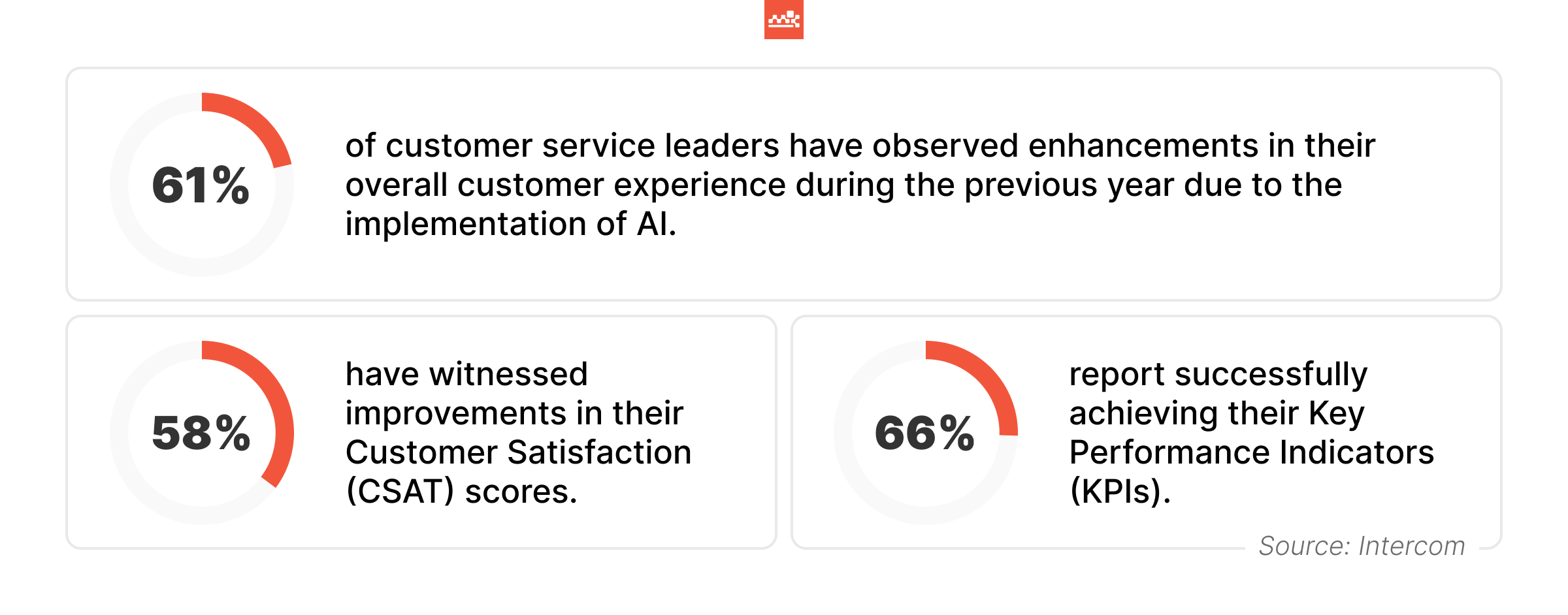
In the past, customer service was often reactive and limited by human capacity. Long wait times and repetitive queries were the norms, leading to consumer frustration. Now, we have entered the era of AI-driven client assistance. Artificial intelligence doesn’t simply manage; it learns and adapts, delivering personalized replies and predictive solutions. This transition marks a significant leap from mere transactional relations to engaging experiences.
AI is revolutionizing communications, primarily through conversation intelligence. This technology goes beyond automated responses; it understands context, gauges sentiment, and provides tailored support. Using it, companies analyze vast amounts of data from dialogues, turning them into actionable insights. This allows businesses to not only respond to buyer needs but also anticipate them, offering a proactive approach to client care.
The integration of AI into customer service channels is a complete overhaul of the traditional paradigm. It’s about creating a more intuitive, efficient, and satisfying user experience. This way we can align our strategies with the dynamic expectations of today’s consumers.
Key Benefits of Conversational AI for Customer Engagement
Artificial intelligence fundamentally transforms the landscape of customer retention. The evidence is in the numbers: 69% of AI-adopting organizations report upgraded support service capabilities, while 55% enjoy shorter wait times. Additionally, 48% see a boost in buyer satisfaction, and 41% leverage the technology for better data analysis. These improvements foster stronger, long-term consumer relationships and heighten overall contentment with the services provided.

Let’s explore the crucial advantages that make this possible:
- 24/7 availability. Ever-present, Conversational AI offers uninterrupted client care. Its round-the-clock assistance ensures consumers always have help at hand, breaking free from the limitations of traditional working hours.
- Personalized customer conversations. AI doesn’t just respond; it adapts. By analyzing data and dialogues, it crafts answers that resonate with each buyer. Thus, every interaction feels unique and valued.
- Efficiency in handling queries. AI-driven systems are capable of managing multiple inquiries at once. They streamline operations and slash waiting times, leading to faster solutions and happier customers.
- Enhanced data analysis. A powerhouse in datasets interpretation, the technology turns each exchange into actionable insights. Conversational intelligence is driving smarter business decisions and support enhancements.
- Improved customer satisfaction. The blend of cost-effectiveness, personalization, and constant accessibility fosters positive brand perception, transforming service from a basic necessity into a defining aspect of the user journey.
It’s evident that businesses stand to gain significantly from implementing Conversational AI in customer engagement. However, there are important considerations and best practices to bear in mind. I’ve prepared a concise guide detailing key aspects every business should know to navigate this technological advancement successfully.
How to Implement Conversational AI Successfully
Effectively incorporating artificial intelligence into customer engagement strategies requires a strategic approach, mindful of both the possibilities and the pitfalls. While the benefits are clear, companies often face challenges during implementation. Key issues include training agents (30%), professional services support (27%), integration complexities (23%), lack of necessary features (19%), and user-friendliness (14%). Addressing such problems head-on is crucial for a smooth transition.
When integrating artificial intelligence into your client care strategy, consider these six best practices:
- Robust conversation design. Craft dialogues that are engaging, natural, and reflective of your brand’s voice. This involves understanding consumer needs and preferences to create meaningful communication.
- Leverage data insights. Utilize the observations gathered from interactions to continually refine and improve dialogue flows and responses, ensuring they remain relevant and effective.
- Seamless integration with existing systems. Verify that the AI solution works harmoniously with your current CRM and data infrastructure for a unified procedure of information management.
- Focus on user experience. Develop the AI interface to be intuitive and convenient for clients and the employees managing the backend.
- Ongoing training and support. Regularly update and train your team on the latest AI advancements and optimal techniques to maximize the system’s potential.
- Adherence to privacy and compliance standards. Maintain strict data security and adhere to industry-specific regulatory frameworks to protect both your business and your customers.
For enterprises seeking expertise in these areas, Master of Code Global offers tailored solutions. Our Conversational AI Consulting focuses on full-cycle development, from conversation design to integration and optimization, guaranteeing your artificial intelligence implementation is both efficacious and aligned with the set goals. Next, we’ll explore real-life examples, illustrating how these strategies come to life and drive tangible results in various scenarios.
Case Studies
Food Industry Brand Promotion: Dr. Oetker’s Virtual Assistant
At Master of Code Global, we partnered with Dr. Oetker to launch an engaging digital assistant for Giuseppe’s Easy Pizzi Contest. Our innovative solution targeted Gen Z pizza enthusiasts. It promoted the new product line through the bot on Messenger. This tool not only raised awareness about the company but also encouraged competition participation, blending information with entertainment.
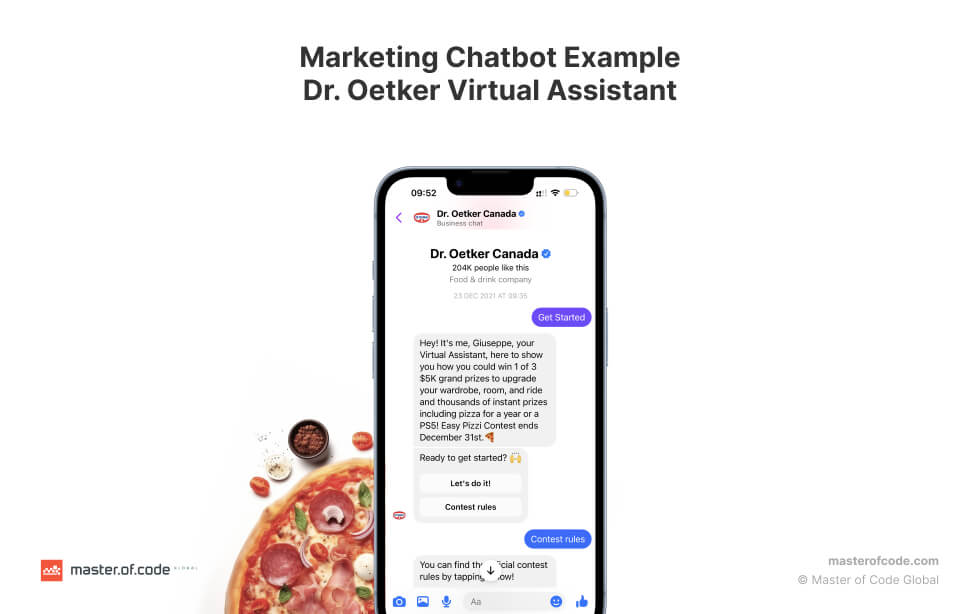
The solution streamlined contest entries and offered a user-driven experience with chances to win instant prizes. We integrated an AR Instagram filter for additional involvement. This made the game more appealing and interactive. The project showcased the power of Conversational AI in enhancing brand engagement.
Driving Auto Sales: Feldman Chatbot
Feldman Automotive Group utilized a Facebook chatbot to enhance sales and customer interactions. Designed to engage car shoppers in proximity to their dealerships, this digital assistant initiated conversations through Messenger. It effectively identified prospective buyers, directing them to visit retailers or complete lead forms.
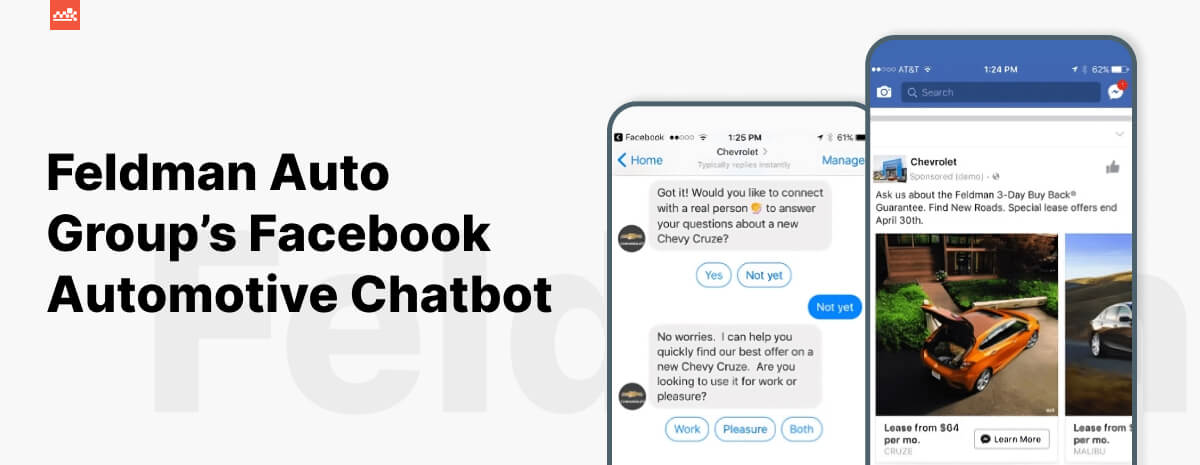
The adoption of this strategy has led to approximately 50 vehicle transactions monthly. Such results underscore the bot’s efficiency in prospect qualification and improving the buyer journey. This method exemplifies the effective use of AI to automate sales processes in the auto sector.
eCommerce Personalization: BloomsyBox’s AI Chatbot
Master of Code Global, in collaboration with Infobip, upgraded BloomsyBox’s Mother’s Day campaign. We created an innovative Generative AI-powered eCommerce bot. This initiative aimed to enhance the gift-giving experience, enabling customers to communicate with the company in a unique and personalized way. Clients interacted with the chatbot to answer daily questions. The first 150 participants providing all correct answers won a free bouquet from the firm.
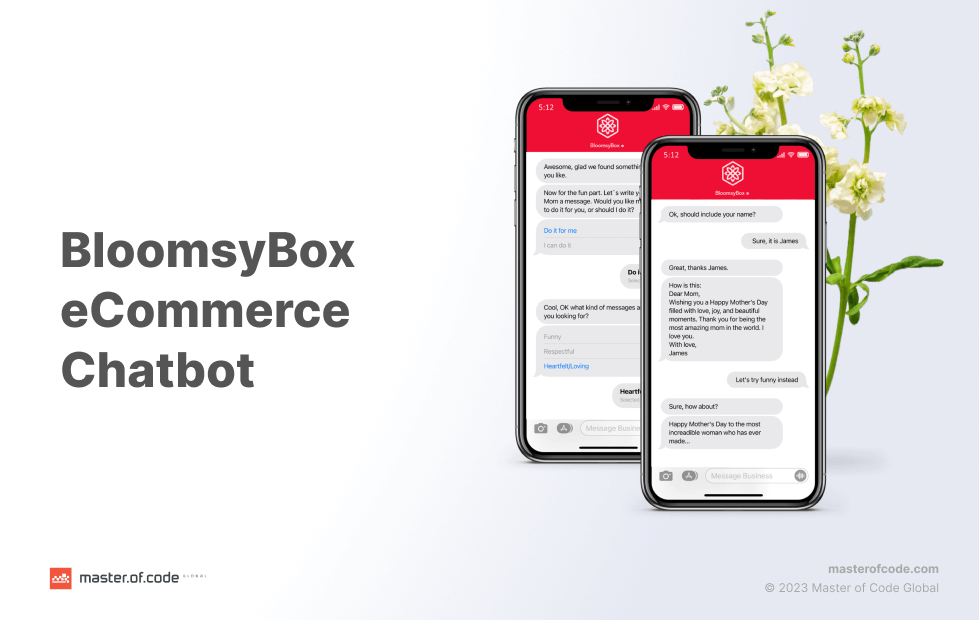
What set this tool apart was its ability to create customized greeting cards using our LLM Orchestration Framework Toolkit (LOFT). This feature allowed winners to generate one-of-a-kind messages for their loved ones. Each was tailored to their preferences, ranging from fun and light-hearted to deep and heartfelt.
The integration of cutting-edge technologies underpinned this seamless and engaging user journey. The campaign’s success was evident, with 60% of users completing the quiz, 28% winning bouquets, and 38% utilizing the Gen AI component for tailor-made greetings. This project demonstrated the immense potential of artificial intelligence in enhancing customer engagement.
Future of Conversational AI in Customer Engagement
Having explored how artificial intelligence is enhancing user engagement, let’s shift our attention to what the future holds for this technology. Currently, 71% of client support leaders anticipate that AI and automation will positively transform customer experiences within the next five years. This optimism is grounded in the evolving capabilities of artificial intelligence.
Future investments are expected to focus on applications that utilize natural language processing. This helps to accurately discern buyer intent, fostering more effective self-service solutions. Additionally, advancements in sentiment analysis, which interprets tone and emotional nuances in interactions, are set to elevate the depth and quality of consumer engagements.
A particularly exciting development is in the realm of Generative AI technologies. These improvements promise to further refine and sophisticate Conversational AI for enterprises. The changes will enable it to generate responses that are increasingly human-like in their relevance and empathy.
Thus, the future of customer engagement through Conversational AI appears promising. Businesses can look forward to AI-driven tools that respond to buyer needs more efficiently. Furthermore, they will contribute to building stronger, more personalized client relationships.
Conclusion
We’ve delved into the pivotal role of Conversational AI in revolutionizing customer engagement. By offering personalized, efficient service around the clock, it’s reshaping how businesses interact with their clients. Its integration, though challenging in areas like training and compatibility, can be navigated through strategic practices such as data-driven conversation design.
As we look ahead, advancements in new technologies, particularly in natural language processing and Generative AI, promise even more innovative and empathetic ways to connect with and understand customers. Are you ready to embrace these innovations and harness their full potential for your business?





